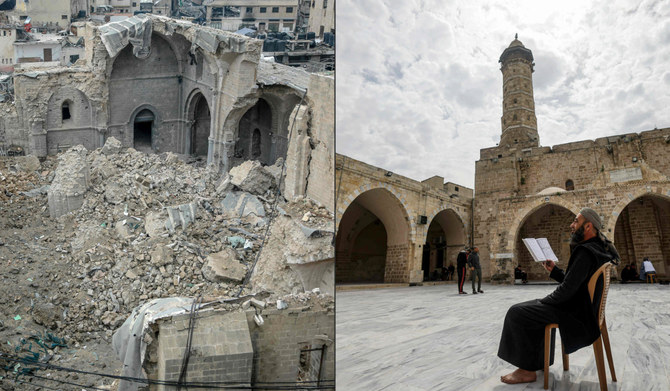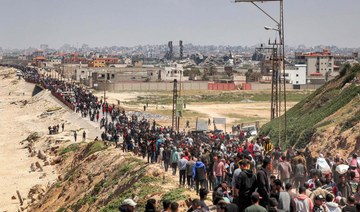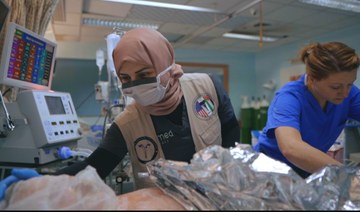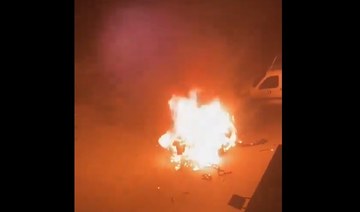JERUSALEM: Gaza’s ancient Greek site of Anthedon has been bombed, its “Napoleon’s Palace” destroyed and the only private museum burned down: the war has taken a terrible toll on the rich heritage of the Palestinian territory.
But in a strange twist of fate, some of its greatest historical treasures are safe in a warehouse in Switzerland.
And ironically, it is all thanks to the blockade that made life in the Gaza Strip such a struggle for the past 16 years.
Based on satellite images, the UN cultural organization reckons some 41 historic sites have been damaged since Israel began pounding the besieged territory after the October 7 Hamas attack.
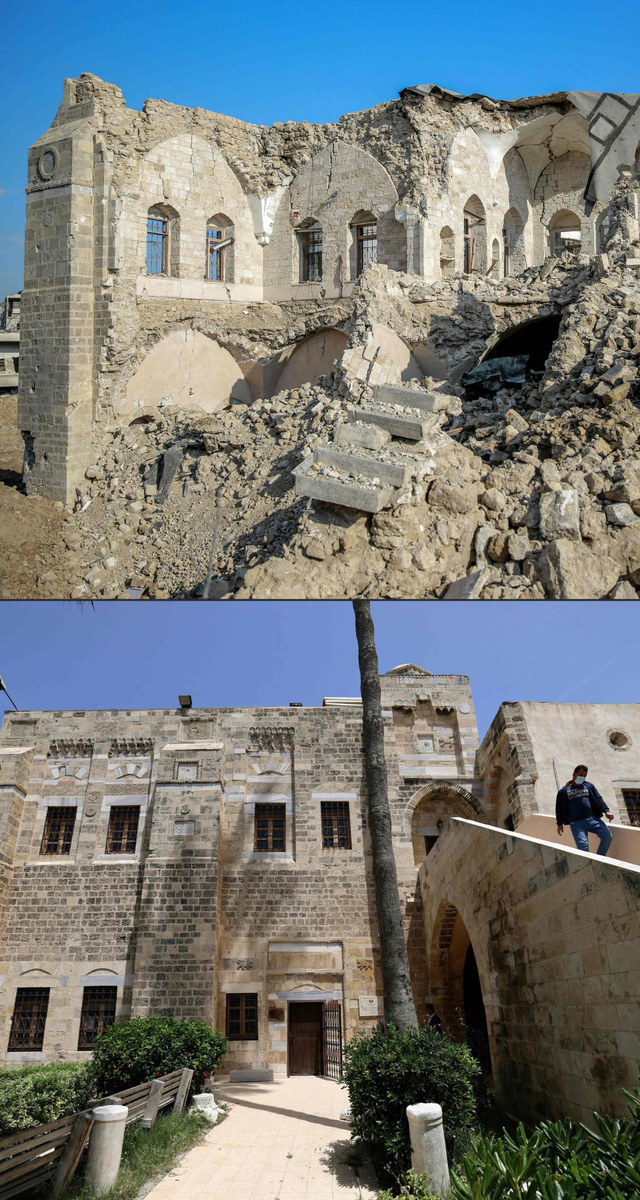
This combination of pictures created on January 11, 2024, shows a file picture of the 17th century Qasr al-Basha in Gaza City on April 21, 2021, where Napoleon Bonaparte slept for several nights during his campaign in Egypt and Palestine (bottom), and the same building severely damaged in Israeli bombardment during the ongoing battles between Israel and the Palestinians. (AFP)
On the ground, Palestinian archaeologist Fadel Al-Otol keeps tabs on the destruction in real time.
When he has electricity and Internet access, photos pour into a WhatsApp group he set up with 40 or so young peers he mobilized to watch over the territory’s vast array of ancient sites and monuments.
As a teenager in the 1990s, Otol was hired by European archaeological missions before going on to study in Switzerland and at the Louvre Museum in Paris.
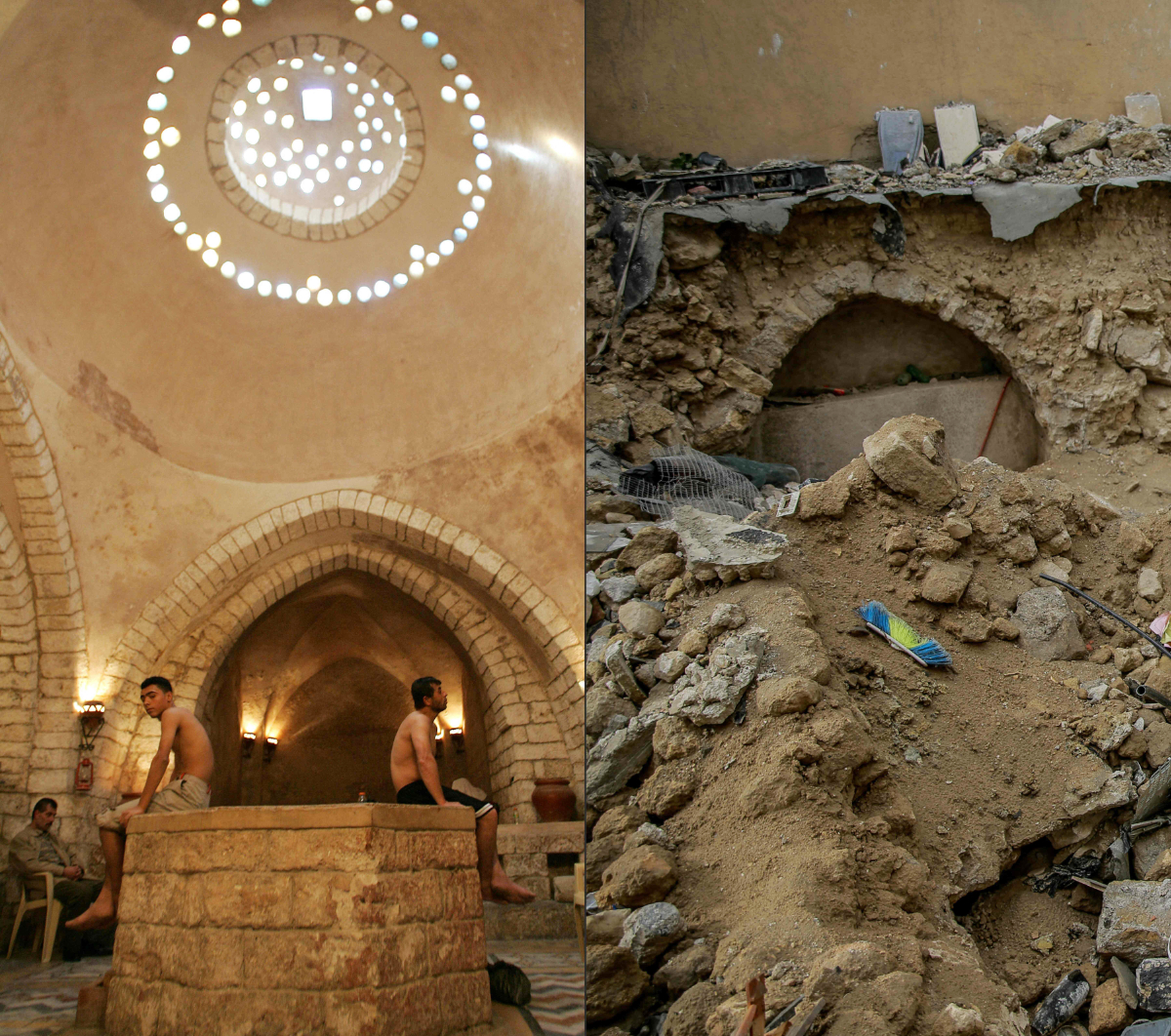
This combination of pictures shows one taken on January 5, 2024 of Gaza City's historic Hammam Al-Samra, which used to be the only active traditional Turkish bath remaining in Gaza, located in the Zeitun quarter of the old city before it was destroyed in Israeli bombardment during the ongoing battles between Israel and the Palestinian Hamas movement and another one (L) dating back to December 4, 2005 with Palestinian youths relaxing in the same steam bath. (AFP)
“All the archaeological remains in the north have been hit,” he told AFP by phone from Gaza.
The human toll since the October 7 Hamas attack has been chilling.
A total of 1,170 people were killed in the unprecedented raid on Israel, according to an AFP tally of Israeli official figures.
Almost 34,000 have died in Gaza in unrelenting Israeli retaliation, according to the territory’s health ministry.
The damage to Gaza’s history has also been immense.
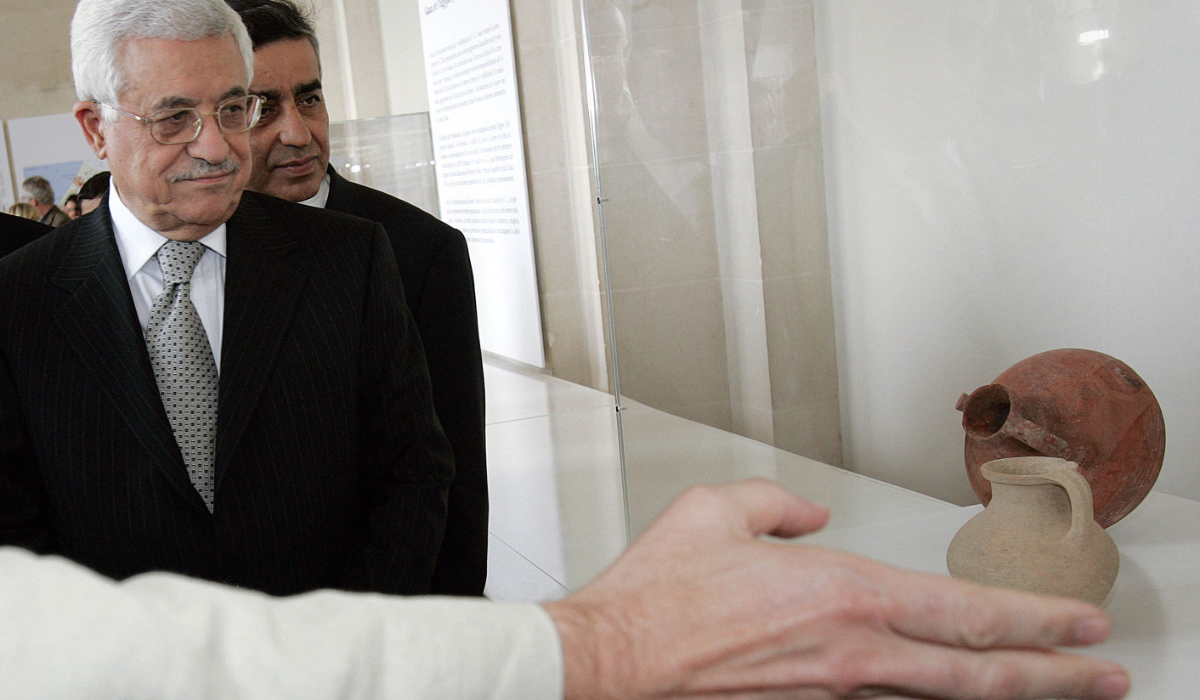
Palestinian President Mahmud Abbas views pottery specimens during his visit to the exhibition "Gaza, at the crossroad of civilizations" at the Art and History Museum in Geneva on April 26, 2007. (AFP)
“Blakhiya (the ancient Greek city of Anthedon) was directly bombed. There’s a huge hole,” said Otol.
He said part of the site, near a Hamas barracks where “we hadn’t started excavating,” was hit.
The 13th-century Al-Basha palace in Gaza City’s old town “has been completely destroyed. There was bombing and (then) it was bulldozed.
“It held hundreds of ancient objects and magnificent sarcophagi,” Otol added as he shared recent photos of the ruins.
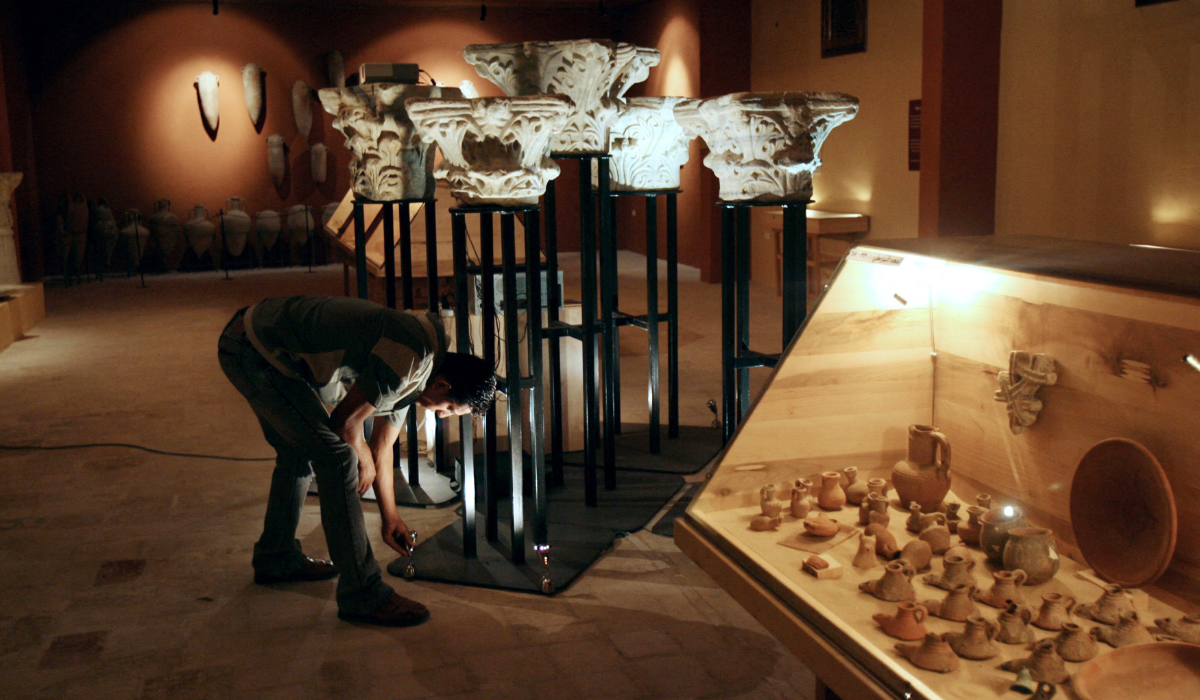
Artifacts are on display in the first ever National Museum of Archaeology in Gaza opend recently by Jawdat Khoudary, a Palestinian businessman and collector, on July 28, 2008. (AFP)
Napoleon is said to have based himself in the ochre stone edifice at the disastrous end of his Egyptian campaign in 1799.
The room where the French emperor supposedly slept was full of Byzantine artefacts.
“Our best finds were displayed in the Basha,” Jean-Baptiste Humbert of the French Biblical and Archaeological School in Jerusalem (EBAF) told AFP.
But we know little of their fate, he said. “Did someone remove the objects before blowing the building up?“
Nerves were frayed even further when the director of Israeli Antiquities, Eli Escusido, posted a video on Instagram of Israeli soldiers surrounded by vases and ancient pottery in the EBAF warehouse in Gaza City.
Much of what has been unearthed in digs in Gaza was stored either at the Al-Basha museum or the warehouse.
Palestinians quickly accused the army of pillaging. But EBAF archaeologist Rene Elter said he has seen no evidence of “state looting.”
“My colleagues were able to return to the site. The soldiers opened boxes. We don’t know if they took anything,” he told AFP.
However, he added: “Every day when Fadel (al-Otol) calls me, I’m afraid he’ll tell me that one of our colleagues has died or that such and such a site has been destroyed.”
Archaeology is a highly political issue in Israel and the Palestinian territories, with discoveries often used to justify the claims of the two warring peoples.
While Israel has an army of archaeologists who have unearthed an impressive number of ancient treasures, Gaza remains relatively untouched by the trowel despite a rich past stretching back thousands of years.
The only sheltered natural harbor between the Sinai and Lebanon, Gaza has been for centuries a crossroads of civilizations.
A pivot point between Africa and Asia and a hub of the incense trade, it was coveted by the Egyptians, Persians, Greeks, Romans and Ottomans.
A key figure in excavating this glorious past over the last few decades has been Jawdat Khoudary, a Gazan construction magnate and collector.
Gaza, with its “seafront real estate,” had a property boom in the 1990s after the Oslo peace accords and the creation of the Palestinian Authority.
When building workers dug up the soil, they came across lots and lots of ancient objects. Khoudary amassed a treasure trove of artefacts that he opened up to foreign archaeologists.
Marc-Andre Haldimann, then curator of MAH, Geneva’s art and history museum, couldn’t believe his eyes when he was invited to have a look around the garden of Khoudary’s mansion in 2004.
“We found ourselves in front of 4,000 objects, including an avenue of Byzantine columns,” he told AFP.
Quickly an idea took shape to organize a major exhibition to highlight Gaza’s past at the MAH, and then to build a museum in the territory itself so that the Palestinians could take ownership of their own heritage.
At the end of 2006, around 260 objects from the Khoudary collection left Gaza for Geneva, with some later going on to be part of another hit show at the Institut du Monde Arabe (IMA) in Paris.
But geopolitics changed along the way. In June 2007, Hamas drove the Palestinian Authority from Gaza. And Israel imposed its blockade.
As a result, the Gazan artefacts could no longer return home and remained stuck in Geneva, while the archaeological museum project fizzled out.
But Khoudary did not give up hope. He built a museum-hotel called Al-Mathaf, museum in Arabic, on the Mediterranean coast north of Gaza City.
But then came the Israeli ground offensive after the Hamas attack on October 7, which began in Gaza’s north.
“Al-Mathaf remained under Israeli control for months,” Khoudary, who fled Gaza for Egypt, told AFP. “As soon as they left, I asked some people to go there to see what state the place was in. I was shocked. Several items were missing and the hall had been set on fire.
His mansion was also destroyed during fierce fighting in the Sheikh Radwan neighborhood of Gaza City.
“The Israelis flattened the garden with bulldozers... I don’t know whether objects were buried (by the bulldozers) or whether the marble columns were broken or looted. I can’t find words,” he added.
The Israeli military did not comment on specific sites. But it accused Hamas of systematically using civilian structures like cultural heritage sites, government buildings, schools, shelters and hospitals for military purposes.
“Israel maintains its commitments to international law, including by affording the necessary special protections,” the army added in a statement.
While part of Khoudary’s collection has been lost, the treasures held in Switzerland remain intact, saved by the blockade and the red tape that delayed their return.
“There were 106 crates ready to go” for years, said Beatrice Blandin, the MAH museum’s current curator.
Safely far from the war raging in Gaza, “the objects are in good condition,” she added. “We restored some of the bronze pieces that were slightly corroded and repacked everything.
“We just had to be sure that the convoy would not be blocked,” she told AFP. “We were waiting for that green light.”
But with any return impossible for the moment, Blandin said “discussions are under way” for a new Gaza exhibition in Switzerland.
Khoudary is excited by the idea.
“The most important collection of objects on the history of Gaza is in Geneva. If there is a new show, it will allow the whole world to learn about our history,” he told AFP from Cairo.
“It’s an irony of history,” said Haldimann, who is trying to get his friend Fadel Al-Otol safely out of Gaza.
“A new Gaza exhibition would show once again that Gaza... is anything but a black hole.”







